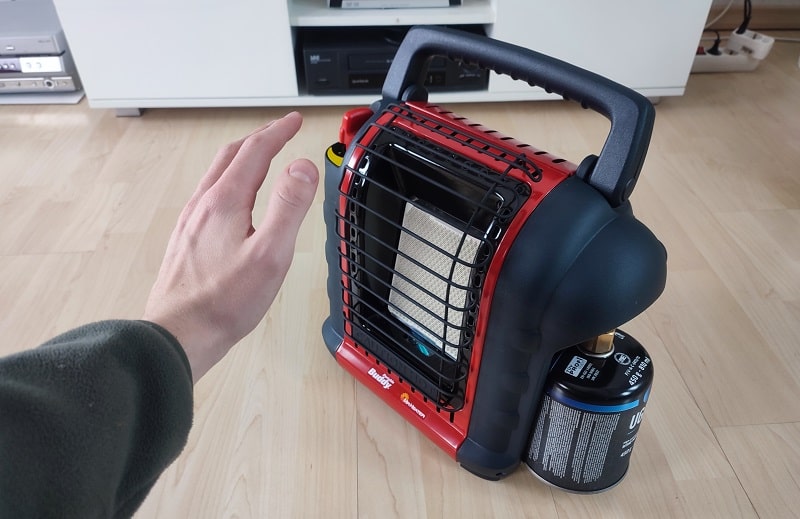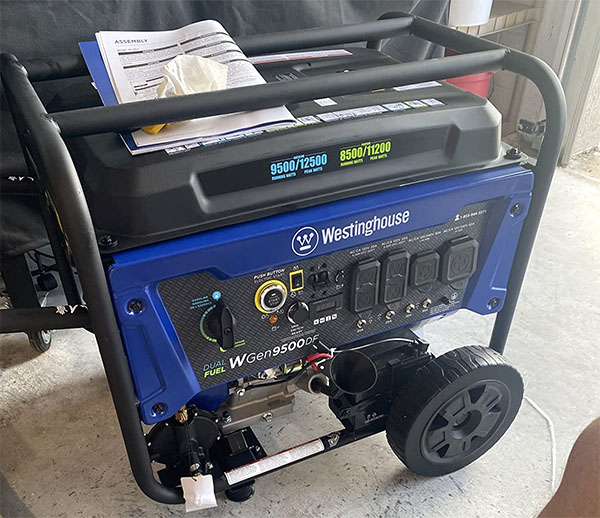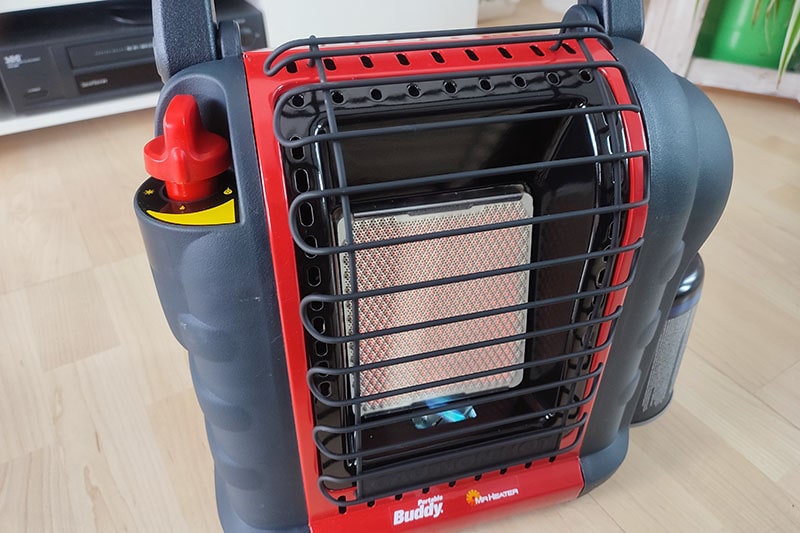Do propane heaters need electricity? There are two kinds of propane heaters. Those that need electricity, and those that don’t.
In this article, you will learn which propane heaters you can use without electricity, completely off-grid!
And you will learn about the types of propane heaters that use electricity and why.
Quick answer: No, portable propane heaters never need electricity and work fully off-grid. However, central heating propane furnaces need electricity to run their built-in electronic thermostat, timers, and fans. Also, some RV propane heaters rely on the 12V car battery to run. Because only portable propane heaters work without electricity, you should always have one at home as an emergency heat source. Alternatively, you can power your propane furnace off a generator.
Which propane heaters work without electricity?
Portable propane heaters always work without electricity. That’s their main selling point.
Technically, portable heaters rely on electricity to produce a spark that ignites the gas.
But you produce this spark independently of an electric grid using the built-in mechanical Piezo igniter. The igniter is a spring-loaded hammer that hammers on a crystal. The impact causes a high voltage, which, in turn, creates a spark.
But that’s not the kind of electricity you mean.
Portable propane heaters always work fully off-grid. You don’t need access to electricity.
This means you can use portable propane heaters in off-grid cabins, RVs, tents, or in any other place without electricity.
You can also rely on portable propane heaters in an electricity outage. You only need to keep a gas tank (or small 1lb propane bottles) around.
Recommended portable propane heater that works without electricity
My favorite portable propane heater is the Mr. Heater Buddy (click here to view it on amazon).
This one is strong enough to keep a large living room warm in winter.
If you need more power than that, or if the space you want to heat is poorly insulated, then you should get the bigger Mr. Heater Big Buddy (click here to view it on amazon). The Big Buddy outputs up to double the amount of heat of the Buddy.
Personally, I got mine as a backup heater in case of an electricity outage. But you can, of course, use them anywhere off-grid as well.
Heck, you can even use them as supply heating simultaneously with your central heating. Gas is a lot more affordable than electricity.
Also, the Mr. Heater Buddy models are absolutely indoor-safe.
If you want to know more before getting your Mr. Heater, check out my review.
I’d say that every household should have at least one portable propane heater. Honestly, it does not have to be a Mr. Heater model. Other propane heaters might work just as well.
It’s just the model that I (and many others) have at home as well, so I tend to recommend it.

Anyways, let’s have a look at propane heaters that do need electricity.
Which propane heaters need electricity?
Propane heaters are gas-fueled. So, why would a propane heater ever use electricity?
Intuitively propane heaters that rely on electricity don’t make sense.
In the end, you use propane gas to be independent of electricity.
But that’s not the case. Here’s which propane heaters need electricity:
RV heaters
Some RV propane heaters don’t have a built-in mechanical igniter. Instead, they rely on the 12V car battery to provide electric power.
Some other RV propane heaters need regular batteries (eg. LR20 models) for the ignition. And you have to replace the batteries every few months or years depending on the usage.
But of course, there are also RV heaters that work fully independently of any source of electricity.
If you are not sure, you can simply get a Mr. Heater Buddy propane heater (which I recommended earlier) for your RV. This one never needs electricity.
Propane furnaces
Modern propane furnaces rely on electricity. With propane furnaces, I mean the big propane heaters that you use as central heating.
If you’ve ever seen a central heating system, you can tell that the front panel is full of settings.
You can set different day and night temperatures. You can set timers when the central heating has to shut off. And you can turn on and off the heating.
Of course, these features all need electricity to work.
In addition, gas furnaces oftentimes have a built-in electronic thermostat that controls the gas valve.
But why?
50 to 100 years ago, gas furnaces were, of course, completely analog. They did not rely on electricity. In case you live in a very old building, it might be that your central heating does not work electrically.
But that’s unlikely since houses are continuously upgraded.
Electronics in a propane furnace ensure that each furnace works just the same. It’s a lot simpler for furnace companies to produce an electronic valve control than to properly fine-adjust each device individually.
In addition to that, we modern humans want the luxury of automatic gas-usage reduction at night and an energy-efficient thermostat.
That’s the reason we ended up with propane furnaces that require electricity to run. I guess it’s understandable.
Do propane furnaces work during an electricity outage?
No, propane furnaces stop working during an electricity outage.
Even though the heat source is gas, which would burn independently of electricity, propane furnaces shut off during an electricity outage.
The reason is that the embedded electronics, such as the thermostat which controls the gas valves don’t work without electricity.
Actually, that’s not only the case for gas furnaces. Many oil furnaces stop working without electricity.
How to prepare for an electricity outage?
To prepare for an electricity outage, it is, therefore, important to either have a backup electricity source, or a backup heat source.
Let’s have a look at both of them.
Power your propane furnace off a generator
Propane furnaces don’t need a lot of electricity. In an energy outage, you could power your propane furnace off a 1,000W generator.
Buying a 1,000W generator, however, hardly makes sense. In the end, you want reliable heat and electricity during an energy outage.
So, I would recommend getting this Westinghouse 6,600W generator (click here to view it on amazon) for electricity outages.
The Westinghouse generator is able to power your propane furnace and many other heavy-duty devices simultaneously.
Just make sure that you use long heavy-duty extension cords when you use large devices with this generator.
I recommend this 100 feet Clear Power extension cord (click here to view it on amazon).
This one comes in very handy when your furnace is in the basement and you have to get the electricity upstairs somehow.
It can handle enough current to power your furnace, fridge, your TV, and chargers simultaneously.

Use a portable propane heater
Alternatively, you should always keep a propane tank (I recommend 100 lbs) and a portable propane heater at home.
A 6,000 BTU propane heater (which is large enough to keep your living room warm) will last 12 days of continuous 24h heating during an outage.
That’s more than enough in most cases!
Portable propane heaters are very affordable. They cost anywhere between $100 and $200. And they can save your and your family’s life when the energy goes out during the winter.
That’s why, in my opinion, every household should have a portable propane heater at home.
Not only are they great for RV trips, garages, basements, or even in tents, but they are also a literal lifesaver in emergencies.
Modern propane heaters are fully indoor safe and they emit zero carbon monoxide.
Again, I recommend the Mr. Heater Buddy (click here to view it on amazon).
Conclusion
Some propane heaters need electricity and won’t work without it. So, it is very important that you always have a backup heat source at home.
You either need a generator to run your propane furnace from, or you need a portable propane heater.
Portable propane heaters are very affordable. And they are a maintenance-free one-off expense. You buy it once and you are covered for the next decades of outages.
Also, get a 20lb to 100lb propane tank depending on the length of the outages you suspect. With 20lb you can heat your living space for 2-3 days. With 100lb you can heat for 12 days continuously.

